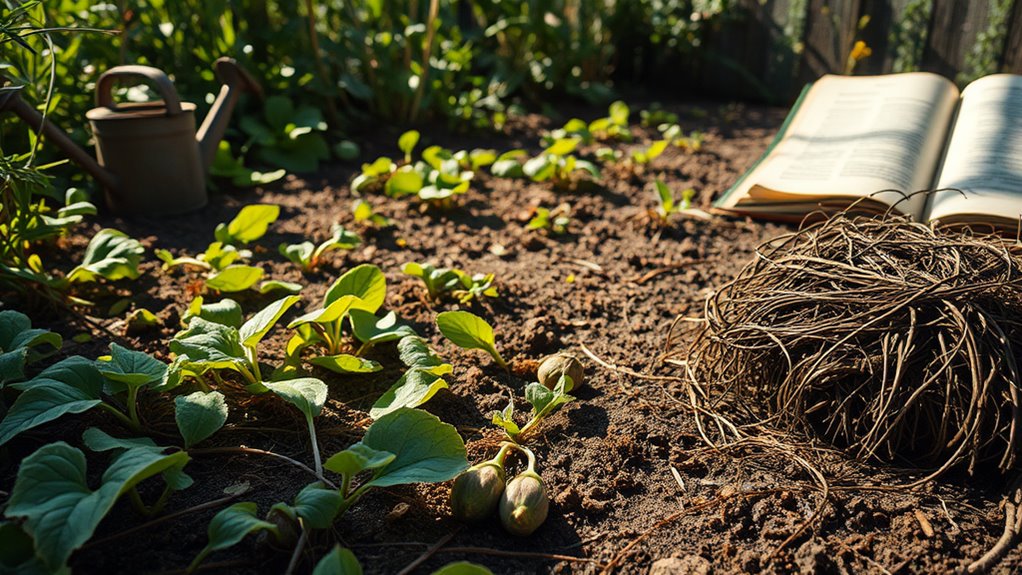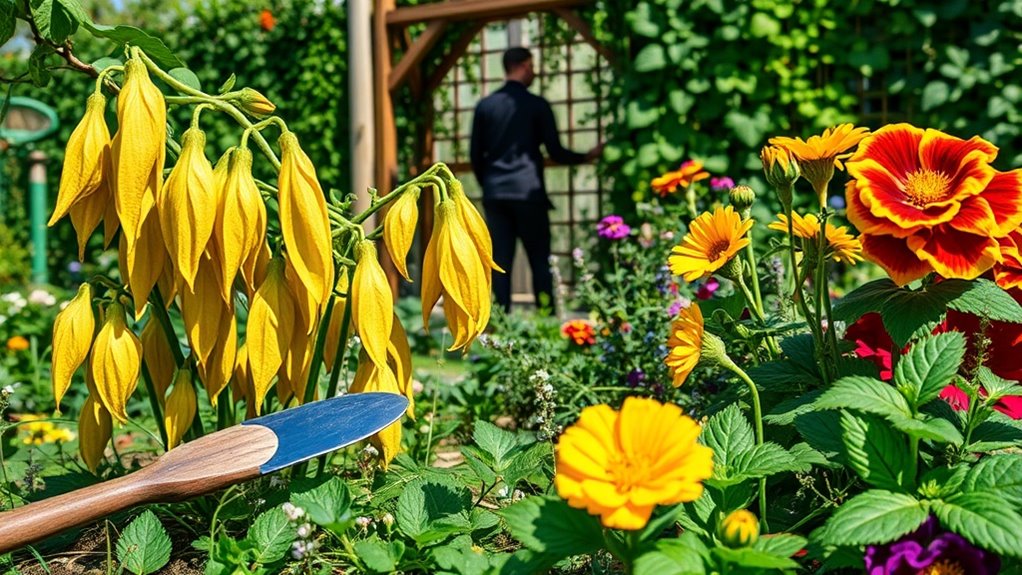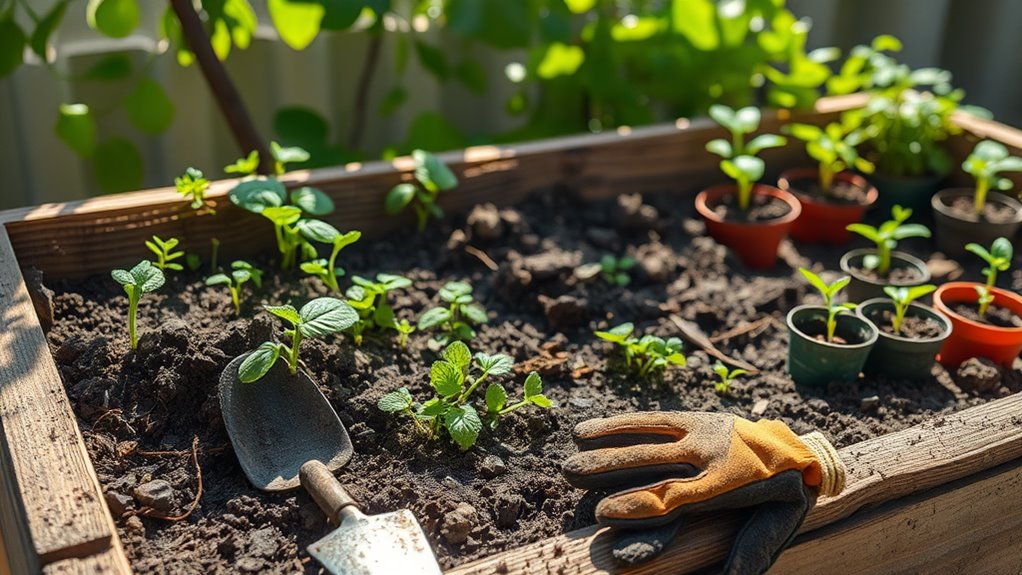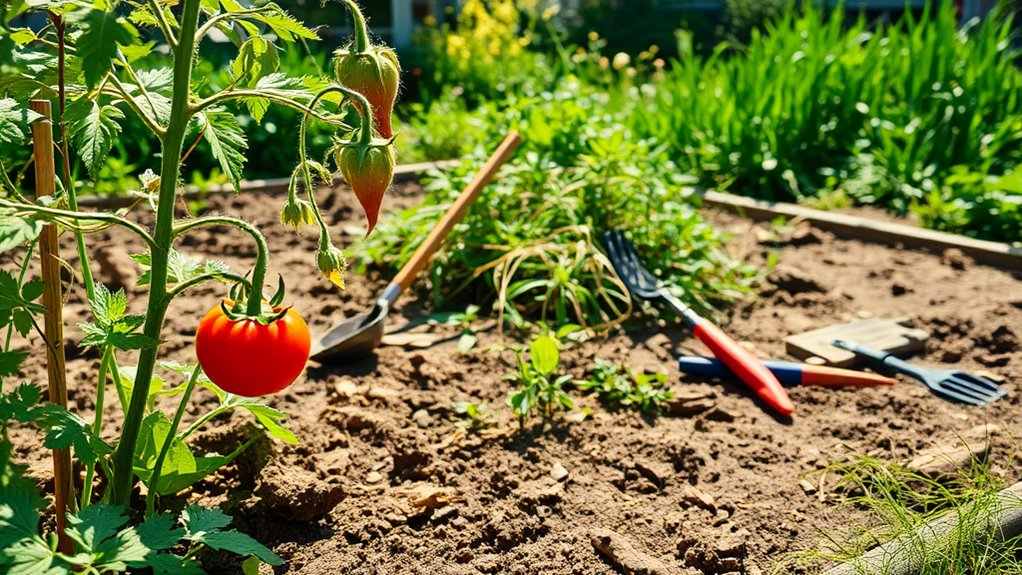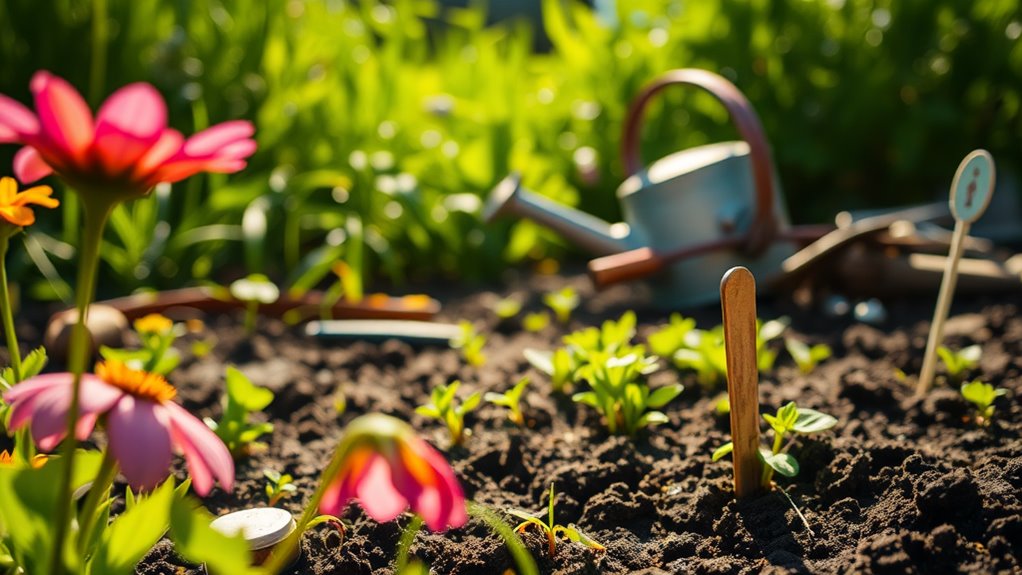These Gardening Mistakes Cost Me My Entire Crop!
Overwatering your plants can suffocate roots, leading to root rot and inviting diseases. Ignoring soil quality hampers nutrient uptake, causing deficiencies that weaken your crop. Planting at the wrong time disrupts growth cycles and can prevent fruiting. Neglecting pest control allows infestations to wipe out your plants. Choosing the wrong location impacts sunlight and drainage, while skipping fertilization and failing to rotate crops can deplete soil health. Learn about these issues to safeguard your garden’s success.
Overwatering My Plants
Overwatering is one of the most common gardening errors, causing roots to suffocate and rot.
When you water too frequently or in excessive amounts, the soil becomes saturated, depriving roots of the oxygen they need.
This condition encourages fungal growth and invites pests, further stressing your plants.
It’s essential to know each plant’s specific requirements and adjust your watering habits accordingly. Additionally, understanding the signs of overwatering can help you catch issues before they escalate and save your plants from unnecessary stress.
Ignoring Soil Quality
Ignoring soil quality can lead to a host of problems in your garden. Regular soil testing helps you understand nutrient levels and pH balance, ensuring your plants receive what they need to thrive. Additionally, soil testing can help identify and remedy issues that may be causing your garden to fail.
Soil Testing Importance
Soil quality plays an essential role in the success of your garden, yet many gardeners overlook the importance of soil testing.
Testing your soil helps you understand its composition and pH levels, ensuring ideal growth for your plants.
Here are some key reasons to prioritize soil testing:
- Identifies nutrient deficiencies
- Reveals pH balance
- Detects contaminants
- Guides amendment decisions
Nutrient Balance Awareness
A balanced nutrient profile is essential for thriving plants, yet many gardeners tend to overlook how soil quality directly impacts this balance. Neglecting soil tests can lead to disastrous results, as you might unknowingly deprive your plants of essential nutrients. Here’s a quick look at what can happen when you ignore soil quality:
| Nutrient Deficiency | Resulting Impact |
|---|---|
| Nitrogen | Stunted growth |
| Phosphorus | Poor root development |
| Potassium | Weak plants, disease |
| Calcium | Blossom end rot |
| Magnesium | Yellowing leaves |
Don’t let nutrient imbalances sabotage your gardening efforts!
Planting at the Wrong Time
When you plant your seeds or seedlings at the wrong time, you risk their growth and overall health. Understanding seasonal planting guidelines and being aware of frost dates are essential for your garden’s success. Ignoring these factors can lead to wasted effort and disappointment as plants struggle to survive in unsuitable conditions. Additionally, optimal planting times can significantly enhance the flavor of your culinary herbs.
Seasonal Planting Guidelines
Have you ever wondered how the timing of your planting can impact your garden’s success?
Planting at the wrong time can lead to poor yields or total crop failure.
To avoid this, consider these seasonal planting guidelines:
- Know your region’s climate and growing season.
- Plant cool-season crops in early spring or fall.
- Reserve warm-season crops for late spring and summer.
- Rotate crops each year to prevent soil depletion.
Frost Dates Awareness
How can a simple frost date derail your gardening plans? Ignoring these vital dates can lead to disaster.
Planting too early, before the last frost, exposes tender seedlings to cold temperatures, stunting growth or killing them outright.
Conversely, waiting too long might mean missing the ideal window for certain crops, resulting in reduced yields.
To succeed, you need to know your local frost dates, which can vary considerably by region.
Utilize a gardening calendar or local extension services to stay informed.
Neglecting Pest Control
Why do so many gardeners overlook pest control in their efforts to cultivate a thriving garden?
This neglect can lead to devastating consequences.
Pests can wipe out your hard work in no time.
Recognizing the importance of pest management is essential.
Here are some key reasons to prioritize it:
- Early detection helps prevent infestations.
- Natural predators can assist in controlling pest populations.
- Regular monitoring keeps your plants healthy.
- Integrated pest management (IPM) strategies minimize chemical use.
- Understanding top garden pests that threaten your plants can improve your pest management approach.
Choosing the Wrong Location
Ignoring pest control can lead to bigger issues, and another common pitfall gardeners face is choosing the wrong location for their plants.
Planting in shaded areas or spots with poor drainage can stunt growth and increase disease risks.
You should assess sunlight exposure, as most vegetables require at least six hours of direct light daily.
Additionally, consider wind patterns; strong winds can damage delicate plants.
Avoid low-lying areas that collect water, creating a soggy environment.
Take time to observe your yard throughout the day, ensuring you select a site that meets your plants’ specific needs for ideal growth and health. Furthermore, understanding sunlight requirements is crucial for successful gardening as it directly impacts plant health and yield.
Skipping Fertilization
Have you ever wondered why your plants aren’t thriving despite your best efforts?
One common mistake is skipping fertilization.
Without the right nutrients, your plants can’t grow strong or healthy.
Here are key reasons why fertilization matters:
- Nutrient Deficiencies: Essential elements like nitrogen, phosphorus, and potassium boost growth.
- Soil Quality: Fertilizers improve soil structure and microbial activity.
- Plant Health: Stronger plants resist pests and diseases better.
- Yield: Proper fertilization can greatly increase your crop yield.
Additionally, using an easy organic fertilizer recipe can provide your plants with the necessary nutrients they need to flourish.
Don’t overlook this essential step; your plants rely on it for their sustenance and overall success in your garden.
Failing to Rotate Crops
Ever wondered how crop rotation can transform your garden’s productivity?
Failing to rotate crops can lead to nutrient depletion, as different plants have varying nutrient needs. When you plant the same crops in the same spot year after year, pests and diseases build up in the soil, making your plants vulnerable.
By rotating crops, you disrupt these cycles, promoting healthier plants and reducing the risk of infestations. Additionally, certain crops can enhance soil fertility, benefiting subsequent plantings. Regularly practicing crop rotation techniques can significantly improve your garden’s overall health and yield.
Not Researching Plant Compatibility
Crop rotation isn’t the only strategy for boosting your garden’s health; understanding plant compatibility plays an essential role too.
When you plant incompatible species together, you risk reduced yields or even crop failure.
Here’s what to bear in mind for better results:
- Companion Planting: Some plants enhance each other’s growth, while others inhibit it.
- Nutrient Needs: Certain plants deplete the soil of specific nutrients, harming their neighbors.
- Pest Interactions: Some plants attract beneficial insects, while others may invite pests.
- Space Requirements: Overcrowded plants compete for light and resources, stunting growth.
Research before planting to guarantee your garden thrives!

